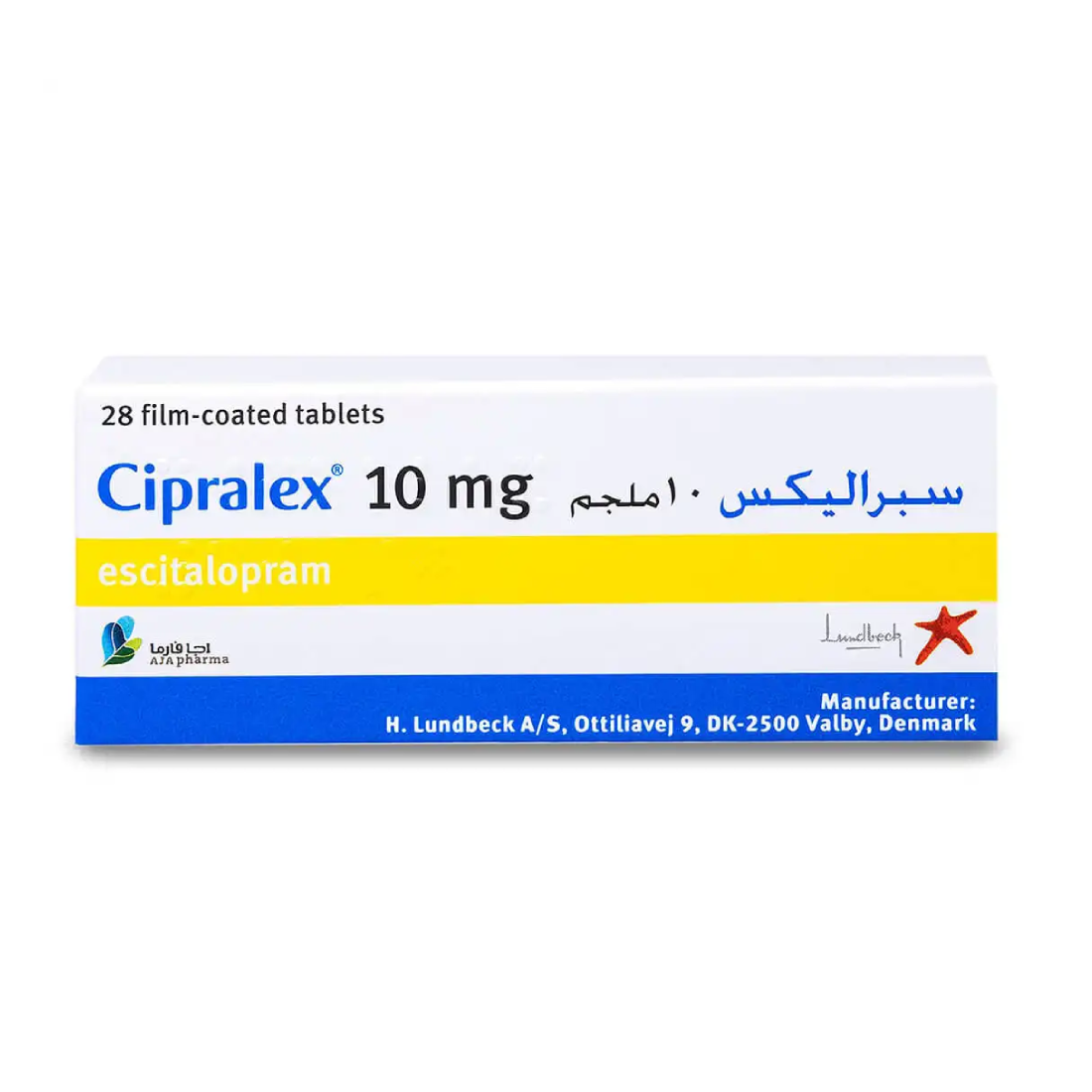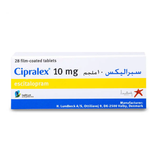

Price includes tax
Couldn't load pickup availability
What Escitalopram is and what it is used for :
Escitalopram belongs to a group of antidepressants called selective serotonin reuptake inhibitors (SSRIs).
These medicines act on the serotonin-system in the brain by increasing the serotonin level.
Disturbances in the serotonin-system are considered an important factor in the development of depression and related diseases.
Escitalopram is used to treat depression (major depressive episodes) and anxiety disorders (such as panic disorder with or without agoraphobia, social anxiety disorder, generalized anxiety disorder and obsessive-compulsive disorder).
It may take a couple of weeks before you start to feel better.
Continue to take Escitalopram, even if it takes some time before you feel any improvement in your condition.
You must talk to a doctor if you do not feel better or if you feel worse.
Do not use Escitalopram
If you are allergic to Escitalopram or any of the other ingredients in this medicine
If you are born with or have had an episode of abnormal heart rhythm (seen at ECG; an examination to evaluate how the heart is functioning).
You Should let Your Doctor Know :
if you have epilepsy. Treatment with Escitalopram should be stopped if seizures occur for the same time or if there is an increase in the seizure frequency
if you suffer from impaired liver or kidney function. Your doctor may need to adjust your dosage.
if you have diabetes. Treatment with Escitalopram may alter glycemic control. Insulin and/or oral hypoglycemic dosage may need to be adjusted.
If you have a decreased level of sodium in the blood.
if you have a tendency to easily develop bleedings or bruises.
if you are receiving electroconvulsive treatment.
If you have coronary heart disease.
If you suffer or have suffered from heart problems or have recently had a heart attack.
If you have a low resting heart-rate and/or you know that you may have salt depletion as a result of prolonged severe diarrhea and vomiting (Being sick) or usage of diuretics (water tablets).
If you experience a fast or irregular heartbeat, fainting, collapse or dizziness on standing up, which may indicate abnormal functioning of the heart rate.
If you have or have previously had eye problems, such as certain kinds of glaucoma (increased pressure in the eye).
Inform your doctor about the medicines you are taking, especially mention to you doctor if you are taking:
”Non-selective monoamine oxidase inhibitors (MAOIs)”, containing phenelzine, iproniazid, isocarboxazid, nialamide, and tranylcypromine as active ingredients. If you have taken any of these medicines you will need to wait 14 days before you start taking Escitalopram.
After stopping Escitalopram you must allow 7 days before taking any of these medicines.
“Reversible, selective MAO-A inhibitors”, containing moclobemide (used to treat depression).
“Irreversible MAO-B inhibitors”, containing selegiline (used to treat Parkinson’s disease).
These increase the risk of side effects.
The antibiotic linezolid.
Lithium (used in the treatment of manic-depressive disorder) and tryptophan.
Imipramine and desipramine (both used to treat depression).
Sumatriptan and similar medicines (used to treat migraine) and tramadol (used against severe pain).
These increase the risk of side effects.
Cimetidine, lansoprazole and omeprazole (used to treat stomach ulcers), fluconazole (used to treat fungal infections), fluvoxamine (antidepressant) and ticlopidine (used to reduce the risk of stroke).
These may cause increased blood levels of escitalopram.
St. John's Wort (Hypericum perforatum) - an herbal remedy used for depression.
Acetylsalicylic acid and non-steroidal anti-inflammatory drugs (medicines used for pain relief or to thin the blood, so called anti-coagulant).
These may increase bleeding-tendency.
Warfarin, dipyridamole, and phenprocoumon (medicines used to thin the blood, so called anti-coagulant).
Your doctor will probably check the coagulation time of your blood when starting and discontinuing Escitalopram in order to verify that your dose of anti-coagulant is still adequate.
Mefloquine (used to treat Malaria), bupropion (used to treat depression) and tramadol (used to treat severe pain) due to a possible risk of a lowered threshold for seizures.
Neuroleptics (medicines to treat schizophrenia, psychosis) and antidepressants (tricyclic antidepressants and SSRIs) due to a possible risk of a lowered threshold for seizures.
Flecainide, propafenone, and metoprolol (used in cardiovascular diseases) clomipramine, and nortriptyline (antidepressants) and risperidone, thioridazine, and haloperidol (antipsychotics).
The dosage of Escitalopram may need to be adjusted.
Medicines that decrease blood levels of potassium or magnesium, as these conditions increase the risk of life-threatening heart rhythm disorder.
Children and adolescents
Escitalopram should normally not be used for children and adolescents under 18 years.
Always take Escitalopram exactly as your doctor has told you.
You should check with your doctor or pharmacist if you are not sure.
Adults :
Depression :
The normally recommended dose of Escitalopram is 10 mg taken as one daily dose.
The dose may be increased by your doctor to a maximum of 20 mg per day.
Panic disorder :
The starting dose of Escitalopram is 5 mg as one daily dose for the first week before increasing the dose to 10 mg per day.
The dose may be further increased by your doctor to a maximum of 20 mg per day.
Social anxiety disorder :
The normally recommended dose of Escitalopram is 10 mg taken as one daily dose.
Your doctor can either decrease your dose to 5 mg per day or increase the dose to a maximum of 20 mg per day, depending on how you respond to the medicine.
Generalized anxiety disorder :
The normally recommended dose of Escitalopram is 10 mg taken as one daily dose.
The dose may be increased by your doctor to a maximum of 20 mg per day.
Obsessive-compulsive disorder :
The normally recommended dose of Escitalopram is 10 mg taken as one daily dose.
The dose may be increased by your doctor to a maximum of 20 mg per day.
Elderly patients (above 65 years of age) :
The recommended starting dose of Escitalopram is 5 mg taken as one daily dose.
The dose may be increased by your doctor to 10 mg per day.
Use in children and adolescents :
Escitalopram should not normally be given to children and adolescents.
You can take Escitalopram with or without food.
Swallow the tablet with some water.
Do not chew them, as the taste is bitter.
If necessary, you can divide the tablets by firstly placing the tablet on a flat surface with the score facing upwards.
The tablets may then be broken by pressing down on each end of the tablet, using both forefingers
Stop using the product and seek immediate medical attention if
Swelling of the face, lips, tongue or throat which may cause difficulty in breathing or swallowing
How to store Escitalopram :
Keep this medicine out of the sight and reach of children.
Do not use Escitalopram after the expiry date, which is stated on the label or carton after EXP.
The expiry date refers to the last day of that month.
This medicine does not require any special storage conditions.
Do not throw away any medicine via wastewater or household waste.
Ask your pharmacist how to throw away any medicines you no longer use.
These measures will help to protect the environment
